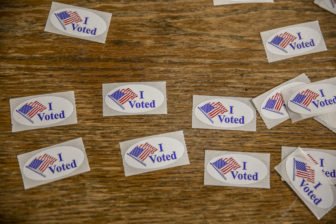

Eric J. Shelton/Mississippi Today, Report For America
“I voted” stickers are in place for voters inside of Twin Lakes Baptist Church in Madison, Miss., Tuesday, November 5, 2019.
A pre-existing health condition that places a person at a greater risk from COVID-19 does not necessarily mean the person can vote early, the Mississippi Supreme Court said in a ruling handed down Friday afternoon.
The state’s highest court said Hinds County Chancery Judge Denise Owens erred in a ruling earlier this month when she wrote current state law “permits any voter with pre-existing conditions that cause COVID-19 to present a greater risk of severe illness or death to vote by absentee ballot during the COVID-19 pandemic.”
Justice Dawn Beam, writing for the majority, said current law, as amended earlier this year by the state Legislature, requires a person to be directed to be quarantined by a physician in order to vote early.
“Having a pre-existing condition that puts a voter at a higher risk does not automatically create a temporary disability for absentee-voting purposes,” she wrote.
The Mississippi Center for Justice and the American Civil Liberties Union, on behalf a group of state voters, had filed a lawsuit attempting to garner the most expansive interpretation of the state law as possible to ensure people can vote early during the pandemic. Secretary of State Michael Watson, who appealed Owens’ ruling, conceded that the four individuals filing the lawsuit, based on their pre-existing conditions, should be allowed to vote early.
The Supreme Court ruling could place an additional onus on local circuit clerks to make decisions — based on their interpretation of the ruling — on who can can vote early.
Rob McDuff with the Mississippi Center for Justice said the ruling was still a victory for those with susceptible to the coronavirus because of pre-existing conditions.
“In filings before the Supreme Court, the secretary of state acknowledged that people with pre-existing conditions that meet the definition of ‘physical disability,’ and that increase the risk of severe consequences from COVID-19 can vote absentee, including four of the plaintiffs whose conditions include kidney disease, lupus, diabetes and severe asthma,” McDuff said. “The Mississippi Supreme Court never repudiated that statement by the secretary… The secretary stated that such conditions do allow absentee voting if they, like the conditions of the four plaintiffs, meet the dictionary definition of a ‘disability.’”
In a statement, the Center for Justice and ACLU said, “We hope the Legislature will go back into session and take action to protect vulnerable people during this public health crisis. Even if the legislators are concerned about mail-in voting, they could expand in-person absentee voting or allow early in-person voting during the pandemic and provide for counties to hold Saturday outdoor sessions during October so people can vote in an outdoor setting where COVID-19 is not so easily transferred.”
Mississippi is among a handful of states not allowing most people to vote early this year either by mail or in person to avoid large crowds during the pandemic. Even before the pandemic, most states allowed early voting, both by mail and in-person. But in Mississippi, early voting in allowed only for people age 65 and older, those away from home on Election Day, and those whose have a disability.
Another lawsuit, filed in federal court by the Lawyers Committee for Civil Rights Under Law, the Southern Poverty Law Center and private attorneys on behalf of state residents and organizations, is claiming the state’s absentee voting rules are unconstitutional because they could jeopardize the health of citizens trying to vote during the COVID-19 pandemic.
The groups filing that lawsuit also are asking that provisions in state law be thrown out requiring the application for an absentee ballot and the ballot itself to be notarized. Mississippi is the only state in the nation to require both documents to be notarized, state Sen. David Blount, D-Jackson, has said in the past.
The post Supreme Court: Some with pre-existing health conditions might not be allowed to vote early appeared first on Mississippi Today.
- In trial of ex-wrestler, Mississippi’s former welfare director testifies about appeasing politicians, trying ‘my very best’ - February 23, 2026
- It’s early, yes, but Mississippi’s college baseball teams have started fast - February 23, 2026
- Mississippi House wants to increase public school oversight - February 23, 2026